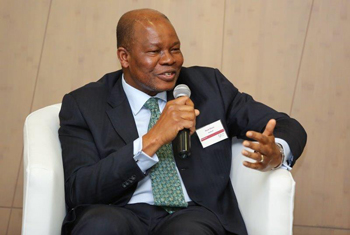Latest News Archive
Please select Category, Year, and then Month to display items
06 April 2018
Photo Rulanzen Martin
 From the left: Dr Thulisile Mphambukeli, leader of the BRICS research team that is exploring the political economy of water and food security, and her research partner, Dr Victor Okorie.
From the left: Dr Thulisile Mphambukeli, leader of the BRICS research team that is exploring the political economy of water and food security, and her research partner, Dr Victor Okorie.
A Brazil, Russia, India, China and South Africa (BRICS) delegation is to hold the 10th Annual BRICS Summit in the last week of May 2018 in Johannesburg. Dr Thulisile Mphambukeli, leader of the University of the Free State (UFS) research team alongside Dr Victor Okorie from the Department of Urban and Regional Planning, in collaboration with Prof Lere Amusan of North-West University, will ensure that water and food security is a prominent feature on the gathering’s agenda.
First, the project titled: “Exploring the political economy of water and food security nexus in BRICS and Africa” will debut at the National Institute for the Humanities and Social Sciences BRICS Think Tank Forum”.
According to Dr Mphambukeli, the key to water security is attitudinal change by means of education and conscientisation. This, she is adamant about, holds the potential to drive behavioural adjustments in the way society interacts with water.
Genetic and social approaches
Dr Okorie asserts that if strides towards reducing the demand for water were to be made, research efforts should be geared towards effecting changes at DNA level. Meaning we need to explore waterwise ways that enable crops and animals to thrive optimally.
The project also looks at social dimensions of water such as flushing a toilet. “Research activities on redesigning toilets, especially the urinal, where more than nine litres of water are used to flush less than one cubic centimetre of urine, are timely in the context of managing water and the food nexus crises,” said Dr Okorie.
Combining the genetic and social approaches would allow us to produce more with a smaller water footprint. This can be made possible by implementing precision agriculture which is about estimating and applying exact quantities of water and nutrients needed for the production of crops or the raising of livestock.
Paradigm shifting policies
Prof Amusan said the team intended to propose functional solutions that take the quality of water into consideration. Equitable production and distribution of water depends on endorsing policies of co-production between citizens, governments and the public sector. BRICS member states mutually consider water and food security as an issue of paramount significance, hence its feature on this prestigious summit’s agenda.
Ethical leadership - the building block for success in business
2015-03-13

Dr Reuel Khoza |
As part of the professional development lecture series, the UFS Business School hosted Dr Reuel Khoza, Chairman of Aka Capital and Nedbank Group Limited, in a presentation to MBAs and the Bloemfontein business community on Leadership challenges of building an ethical organisation. In his presentation, Dr Khoza discussed Nedbank’s journey to success, its approach, and the interventions used to make its success a reality.
He brought to the fore one of the challenges which many companies in South Africa and around the world often face, that is, to change the perception of leadership in a large organisation from a profit-centred orientation to a people-centred one. This is a process that can take years to achieve.
Dr Khoza said “Ethical and well-governed organisations create trust with stakeholders … ethical leadership has a ripple effect on all other leaders at all levels in an organisation” In concluding his presentation, he reiterated that ethical leaders embrace humanity; it is not prescribed as a duty but is self-prescribed.
The professional development lecture series is held at the Business School on the Bloemfontein Campus, hosting prominent speakers on various business-related topics throughout the year.